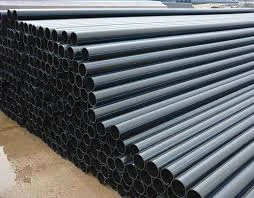నవం . 23, 2024 07:38 Back to list
solid hdpe pipe
Understanding Solid HDPE Pipes A Comprehensive Overview
High-Density Polyethylene (HDPE) pipes have become a staple in various industries due to their remarkable properties and versatility. Solid HDPE pipes, a specific type of HDPE piping, are utilized widely across construction, water management, agricultural sectors, and more. This article delves into the characteristics, advantages, applications, and environmental considerations concerning solid HDPE pipes.
Characteristics of Solid HDPE Pipes
Solid HDPE pipes are made from high-density polyethylene, a thermoplastic polymer characterized by its high strength-to-density ratio. These pipes typically feature a smooth interior surface, which helps facilitate the efficient flow of liquids and gases. They come in various diameters and wall thicknesses, allowing for customization based on specific application requirements.
One of the key features of solid HDPE pipes is their resistance to corrosion, chemicals, and ultraviolet (UV) rays. This makes them ideal for transporting various substances in harsh environments. Additionally, HDPE pipes are lightweight compared to traditional materials like steel and PVC, which simplifies handling and installation.
Advantages of Solid HDPE Pipes
1. Durability Solid HDPE pipes have a long lifespan, often exceeding 50 years, depending on the installation conditions and the specific application. Their resistance to environmental factors minimizes degradation over time.
2. Flexibility and Adaptability The flexibility of HDPE allows for easier bending and manipulation during installation. This adaptability makes them suitable for a variety of terrains and challenges.
3. Low Maintenance Once installed, solid HDPE pipes require minimal maintenance. This is largely due to their resistance to biofilm growth and clogging, which are common issues with other types of piping systems.
4. Cost-Effectiveness While the initial investment might be comparable to other materials, the long-term savings derived from lower maintenance costs and extended lifespan make solid HDPE pipes a cost-effective option.
5. Environmentally Friendly HDPE is recyclable, contributing to a reduction in environmental pollution. The production process also yields fewer emissions compared to other materials, making solid HDPE pipes a more sustainable choice.
solid hdpe pipe

Applications of Solid HDPE Pipes
Solid HDPE pipes are exceptionally versatile and find applications in various fields
- Water Supply Systems One of the most common uses is in municipal water supply networks. Their resistance to corrosion and their ability to maintain water quality make them ideal for potable water transportation.
- Waste Management Solid HDPE pipes are often employed in sewage and drainage systems. They efficiently transport waste due to their smooth interior, which reduces the risk of blockages.
- Agriculture In agricultural settings, these pipes are used for irrigation systems and for conveying fertilizers and chemicals. Their durability and resistance to various chemicals make them particularly advantageous in this sector.
- Industrial Applications Industries utilize solid HDPE pipes for transporting chemicals and gases, benefiting from their strength and resistance to corrosive substances.
Environmental Considerations
As industries shift towards sustainable practices, solid HDPE pipes have risen in prominence. Their production involves less energy compared to traditional materials, and their longevity contributes to less waste. Moreover, the recycling potential of HDPE reduces the overall lifecycle impact of these pipes on the environment.
However, it is essential to consider the entire lifecycle of HDPE piping systems. While solid HDPE pipes are largely eco-friendly, responsible disposal at the end of their life cycle is crucial to maximizing their environmental benefits. Recycling programs and proper disposal methods should be encouraged to minimize any potential negative impacts.
Conclusion
Solid HDPE pipes represent a significant advancement in piping technology, characterized by their durability, flexibility, and environmental advantages. Their diverse applications across various industries underscore their integral role in modern infrastructure and resource management. As we continue to focus on sustainability and efficiency, the importance of utilizing high-quality materials like solid HDPE pipes will only grow, fostering innovation and responsible practices in line with global environmental goals.
-
Premium CPVC Sheet: High-Temp & Chemical Resistant Solutions
NewsAug.15,2025
-
Durable PPR Pipe for Hot & Cold Water Systems - Easy Install
NewsAug.14,2025
-
Durable HDPE Sheet | Versatile & Impact-Resistant Plastic
NewsAug.13,2025
-
Premium PVC Soft Sheets: Clear, Flexible & Durable
NewsAug.12,2025
-
Premium PVC Round Rods: Durable, Chemical Resistant, Easy to Machine
NewsAug.11,2025
-
PP U-channel: Chemical-Resistant, Lightweight & Durable
NewsAug.10,2025

